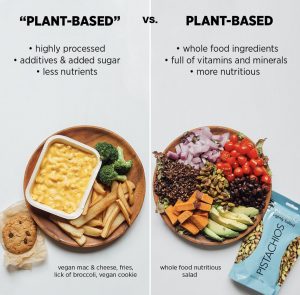The Ultimate Guide to Cooking with Gluten Free BBQ Sauce on a Plant-Based Diet
The Ultimate Guide to Cooking with Gluten Free BBQ Sauce on a Plant-Based Diet
Blog Article
All Regarding Healthy And Balanced Food: Advantages of Enjoying Plant Based Choices
The discussion bordering plant-based diet regimens has obtained considerable attention in recent times. Lots of individuals are exploring the possible wellness advantages, dietary benefits, and ecological influences connected with these nutritional selections. As people become extra knowledgeable about their food's influence on well-being and sustainability, concerns develop concerning the practicalities of adopting such a way of living. What certain adjustments can one anticipate, and exactly how might these selections reshape not only personal health but also the planet's future?
Comprehending Plant-Based Diets
Although lots of people link plant-based diets generally with vegetarianism or veganism, these diet regimens can encompass a variety of consuming patterns that focus on entire, minimally processed plant foods. Such diets frequently include fruits, vegetables, entire grains, nuts, seeds, and legumes, while removing or restricting animal products. This adaptability permits people to tailor their nutritional selections according to personal choices and nutritional requirements. Some may take on a primarily plant-based diet while still sometimes consuming meat or dairy, typically described as a flexitarian technique. The focus continues to be on integrating more plant foods, which can bring about a diverse selection of tastes and dishes. Comprehending these numerous analyses of plant-based eating is crucial for valuing its availability and allure in modern food culture.
Wellness Perks of Plant-Based Foods
The health and wellness benefits of plant-based foods are significant, supplying a nutrient density benefit that sustains overall wellness. Research shows that these foods can enhance heart health and wellness and play a necessary function in effective weight management. By integrating much more plant-based alternatives, people might enhance their dietary options and promote long-term health.
Nutrient Density Advantage
Nutrient thickness plays an essential role in the health advantages of plant-based foods, making them a compelling option for those looking for a well balanced diet regimen. Plant-based foods, such as fruits, veggies, vegetables, nuts, and entire grains, are often rich in crucial vitamins, minerals, and antioxidants while being lower in calories. This high nutrient thickness enables individuals to consume fewer calories while still fulfilling their nutritional needs. Furthermore, these foods are loaded with dietary fiber, advertising digestive system wellness and helping in weight administration. By integrating nutrient-dense plant-based options, consumers can improve their overall wellness, support their immune systems, and decrease the danger of chronic illness. Ultimately, the nutrient thickness of plant-based foods highlights their importance in a health-conscious lifestyle.
Heart Health And Wellness Improvement

Weight Administration Assistance
In addition to advertising heart wellness, a plant-based diet can significantly assist in weight management. This dietary technique highlights entire foods such as fruits, veggies, legumes, nuts, and entire grains, which are normally lower in calories and higher in fiber contrasted to animal-based products. The high fiber content helps raise satiety, reducing overall calorie consumption. Moreover, plant-based diet plans are frequently abundant in vital nutrients while low in undesirable fats, making it simpler to maintain a healthy weight. BBQ Sauces. Research suggests that people that embrace a plant-based way of living have a tendency to have lower body mass indexes (BMIs) and experience more effective weight-loss contrasted to those that take in meat-heavy diet plans. Embracing plant-based alternatives is a calculated selection for effective weight administration.
Nutritional Worth of Plant-Based Active Ingredients
Plant-based active ingredients are rich in crucial nutrients, using a diverse array of vitamins, minerals, and antioxidants that add to total wellness. A contrast of healthy protein resources discloses that while animal items are often considered as remarkable, many plant-based options offer ample protein and other advantageous compounds. Recognizing the nutritional worth of these ingredients can assist people make notified nutritional selections.
Crucial Nutrients in Plants
Nutrient-rich active ingredients found in plants provide a varied selection of important vitamins and minerals that contribute considerably to total wellness. These components are abundant in vitamins A, C, and K, which support immune feature, vision, and blood clotting, specifically. Furthermore, plants offer important minerals such as potassium, calcium, and magnesium, crucial for heart health, muscle function, and bone toughness. The visibility of fiber in plant-based foods aids food digestion and advertises a healthy digestive tract microbiome. Antioxidants, found generously in fruits and veggies, aid combat oxidative stress and anxiety and lower swelling. Lots of plant foods are reduced in calories yet high in nutrients, making them a superb choice for those looking for to maintain a healthy and balanced weight while ensuring perfect nutrient intake.
:max_bytes(150000):strip_icc()/VWF-Plant-Based-Eating-V6-edit1-0a05c9c9c14e489b8e981fbb0221d49e.jpg)
Contrasting Protein Resources
Healthy protein resources vary significantly in their dietary profiles, with plant-based ingredients providing unique advantages. Unlike animal healthy proteins, which often contain saturated fats and cholesterol, plant proteins tend to be lower in these undesirable parts. Legumes, nuts, seeds, and whole grains are abundant in important amino acids, fiber, vitamins, and minerals. As an example, lentils give high healthy protein content together with substantial iron and folate, while quinoa is a total protein, supplying all nine essential amino acids. Additionally, plant-based proteins are often accompanied by anti-oxidants and phytochemicals that sustain overall wellness. The change to plant-based protein resources not just improves nutritional intake yet also lines up with sustainable nutritional practices, decreasing ecological impact and promoting long-term wellness advantages.
Ecological Effect of Plant-Based Consuming
As recognition of climate adjustment expands, lots of individuals are discovering sustainable nutritional options that can significantly lessen their ecological footprint. Plant-based eating has become a substantial factor to minimizing greenhouse gas discharges, which are largely related to animals manufacturing. go to my site The growing of fruits, grains, vegetables, and veggies generally calls for less sources, such as water and land, compared to animal farming. Additionally, plant-based diet regimens can bring about decreased deforestation, as less land is required for grazing livestock or growing pet feed. By moving towards plant-based choices, customers can sustain biodiversity and advertise much healthier ecosystems. Generally, welcoming plant-based consuming not only benefits personal health yet also represents an essential step towards ecological sustainability and conservation efforts.
Overcoming Common Misconceptions
While lots of people recognize the advantages of a plant-based diet, numerous false impressions typically hinder them from totally accepting this way of life. A typical belief is that plant-based diets do not have adequate protein; nevertheless, many plant sources, such as legumes, nuts, and tofu, offer sufficient protein. Additionally, some think that this diet is costly, when in reality, staples like beans, rice, and seasonal veggies can be rather cost effective. One more misunderstanding is that plant-based eating is excessively limiting, whereas it actually offers a diverse selection of tastes and foods. Finally, many stress that a plant-based diet plan may lead to shortages, yet with appropriate planning, individuals can get all needed nutrients, including minerals and vitamins, while enjoying a wide range of tasty dishes.
Tips for Transitioning to a Plant-Based Way of living
Making the change to a plant-based way of living can be an enriching experience, though it usually calls for some assistance to browse the preliminary adjustments. Initially, people are urged to start slowly, integrating even more fruits, vegetables, legumes, and whole grains into their meals while decreasing meat and milk usage. Meal planning is crucial; preparing a regular menu can assist relieve the change and protect against final undesirable options. Exploring new dishes and cooking methods can likewise maintain and improve the experience exhilaration regarding plant-based eating. Furthermore, signing up with support teams or areas can provide motivation and share useful tips. Remaining educated regarding nutrition assurances well balanced dishes, avoiding deficiencies while promoting a healthy and balanced, rewarding plant-based lifestyle.

Delicious Plant-Based Dish Ideas
Discovering tasty plant-based meal concepts can inspire people to embrace a more nutritious diet regimen. One prominent alternative is a passionate quinoa salad, featuring cherry tomatoes, cucumber, and a zesty lemon-tahini dressing. One more favorite is a mouthwatering lentil stew, loaded with carrots, celery, and fragrant natural herbs, ideal for a reassuring supper. For breakfast, overnight oats made with almond milk, chia seeds, and covered with fresh berries supply a nourishing beginning to the day. In addition, a vibrant vegetable stir-fry with tofu and a variety of vivid veggies can be a quick yet pleasing meal. Finally, velvety avocado salute on whole-grain bread, sprinkled with seeds and spices, supplies a straightforward yet flavorful treat. These dishes display the variety and splendor of plant-based eating.

Frequently Asked Questions
Can a Plant-Based Diet Plan Give Sufficient Protein?
The question of whether a plant-based diet regimen can give adequate healthy protein prevails. Countless sources, consisting of legumes, nuts, seeds, and entire grains, can fulfill healthy protein needs properly, sustaining a well balanced and nutritious diet for people.
Are Plant-Based Diet Plans Ideal for Children?
The viability of plant-based diets for children relies on careful preparation. Sufficient nutrients must be guaranteed, including proteins, minerals, and vitamins. With correct guidance, such diet regimens can support healthy and balanced growth and growth in kids.
Exactly how Do I Eat in restaurants on a Plant-Based Diet?
Dining out on a plant-based diet involves looking for dining establishments with varied food selections, requesting for modifications, and checking out vegan-friendly options. Preparation in why not try here advance and communicating dietary choices can boost the eating experience while preserving dietary selections.
What Prevail Irritants in Plant-Based Foods?
Typical allergens in plant-based foods consist of soy, gluten, nuts, and seeds - Sugar Free click here to read Sauces. Individuals following a plant-based diet regimen should understand these irritants and read labels very carefully to stay clear of unfavorable responses and guarantee secure usage
Can Plant-Based Diets Aid With Fat Burning?
Research study suggests that embracing a plant-based diet regimen might help with fat burning due to its typically lower calorie density and greater fiber material. This mix can improve satiation, aiding individuals manage their calorie intake properly. Several individuals link plant-based diets mainly with vegetarianism or veganism, these diets can encompass a broad variety of eating patterns that prioritize entire, minimally processed plant foods. Nutrient thickness plays a crucial role in the health and wellness benefits of plant-based foods, making them an engaging choice for those seeking a balanced diet. Plant-based diet regimens have actually been shown to noticeably improve heart health and wellness, as they frequently contain components that support cardio feature. In addition to promoting heart wellness, a plant-based diet plan can considerably assist in weight monitoring. A common idea is that plant-based diet regimens do not have sufficient protein; nevertheless, countless plant sources, such as beans, nuts, and tofu, provide enough healthy protein.
Report this page